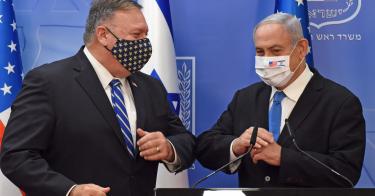Secretary of State Mike Pompeo’s just-concluded diplomatic mission to Israel, the United Arab Emirates, Sudan, Bahrain, and Oman offers three big lessons on what “America First” diplomacy really means.
President Trump’s critics often assert that “America First” means “America Alone.” Nothing could be further from the truth.
Read the president’s National Security Strategy, which he has followed like a blueprint since he came into office. The U.S. is girding itself for great-power competition. The administration’s strategy acknowledges that if that is America is going lean forward anywhere, it needs partners everywhere.
The indictment that the Trump administration is losing allies is a canard that doesn’t hold up under close examination. Consider Pompeo’s latest diplomatic run through the Middle East.
The Trump playbook is not all sticks and no carrots. True, the president leans on allies that aren’t picking up their fair share of the load. Though let’s be honest, allies that don’t contribute to an alliance are pretty weak tea as allies.
These allied nations ought to be called out. But the notion that this administration doesn’t demonstrably support and empower nations that step up their game is simply a falsehood.
Pompeo’s visit to Sudan offers a case in point. In 2019, widespread protests ousted longtime strongman President Omar Hassan al-Bashir. Since then, the government has made serious efforts to institute reforms, improve human rights and normalize relations with its neighbors. Pompeo’s stop in Sudan demonstrated American support for the government’s efforts.
Among the positive steps taken: The U.S. is looking to set the conditions for removing Sudan from the list state sponsors of terrorism. That would be a significant accomplishment for Sudan and really help reintegrate the country into the family of responsible nations.
The U.S. is supporting friends elsewhere as well. Look at Central Europe, where America has been a strong backer and contributor to the Three Seas Initiative, which will help rebuild the region’s infrastructure. The U.S. doesn’t shed allies—it builds partnerships.
Pompeo’s stop in the UAE came on the heels of that nation and Israel announcing a normalization of relations in a deal brokered by the White House. While Pompeo didn’t add any countries to the list during his trip, there is no question the UAE-Israel agreement is building momentum for more change in the region.
All that will mean more opportunities for the U.S. to work together with regional allies to address common security concerns and build prosperity.
The growing list of American friends isn’t limited to the Middle East. On every continent there are leaders who will raise their hand and say they have stronger relations with the U.S. today.
Look to the Indo-Pacific region. U.S. ties with India, for example—a crucial partner—have never advanced faster than under the Trump administration.
Under President Trump, the U.S. is a reliable partner. Just ask Israel, America’s indispensable ally in the Middle East. Trump is not afraid to demonstrate that America is standing with Israel on key issues, despite criticism and controversy.
The Trump administration moved the U.S. embassy in Israel to the nation’s capital in Jerusalem because it was the right and respectful thing to do. The U.S. recognized Israel’s sovereignty over the Golan Heights, critical to the nation’s security.
And Trump refused to let Israel be held hostage to an Israeli-Palestinian peace process that gave the Palestinians a veto over any progress anywhere in the region. The president boldly put his own peace plan on the table.
U.S. commitments are not just limited to the Middle East. Look, for example, in Europe where Trump has dedicated more forward-deployed forces to help defend Poland.
Pompeo’s trip clearly shows there is more to do to implement a sustainable, realistic policy for the Middle East. More nations need to normalize relations with Israel. The U.S. needs to help build a collective framework that can deter Iran, combat extremists and foster regional prosperity.
Pompeo’s efforts, however, also show that the Trump administration is moving the right direction to make “America First” good for America—and its friends.
This piece originally appeared in Fox News




